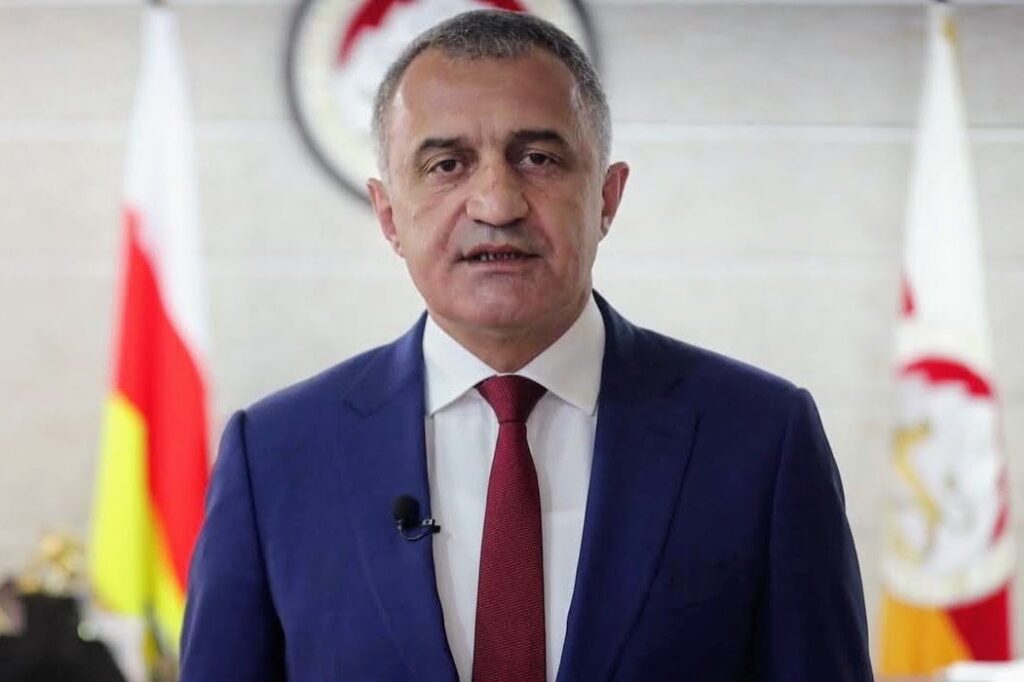South Ossetian President Anatoly Bibilov has said he will take legal steps in the near future towards annexation into the Russian Federation, vowing to unite South Ossetia with Russia ‘in one country’.
His statement came as Bibilov is fighting an election campaign in South Ossetia, and on the background of the involvement of the local soldiers in Russia’s military attack on Ukraine.
Bibilov began a special video address on Wednesday by arguing that Russia, and the ‘Russian world’, defended those loyal to it and ‘stood against Nazism’, a reference to Putin’s claim to have invaded Ukraine in order to ‘de-Nazify’ it. He invoked Russia’s role in ‘defending’ Ossetian people by recognising South Ossetia in 2008 following the August War.
The South Ossetian President went on to insist that Ossetian people, who are mainly divided between South Ossetia and the Russian Republic of North Ossetia, should not ‘miss the opportunity’ to unite under Russia, as he said had happened during the 2014 Russian annexation of Ukraine’s Crimea.
According to Russian legislation, foreign states or parts of other states must formally hold a referendum and support the idea to be admitted as subjects of the Russian Federation, a procedure that Russian authorities claimed to have respected in March 2014 in Crimea after invading the region with their military forces and silencing, intimidating, and expunging local critics of the idea.
‘I believe that uniting with Russia is our strategic goal, our path, the aspiration of the people, and therefore, we are going to be moving. We will take the respective legal steps at the nearest point in time. The Republic of South Ossetia will be part of its historical homeland, Russia,’ Bibilov said.
There have been several previous declarations by South Ossetian leaders and politicians appealing for membership of the Russian Federation, including by Bibilov himself.
The Kremlin, however, has been hesitant to endorse the annexation of South Ossetia, which Georgian authorities have not exercised control over since the early 1990s, and there have so far been no strong indications that the Russian leadership are now serious about the idea.
South Ossetia is recognised by all but five UN Member States as being part of Georgia.
Anatoly Bibilov is currently running for reelection in a vote slated for 10 April. He has faced allegations of failing a written test in the Ossetian language, a prerequisite for heading South Ossetia, as well as being behind a ruling by electoral authorities to block a number of his rivals from registering as presidential contenders.
[Read more on OC Media: Key rivals of South Ossetia's Bibilov barred from running for president]
The announcement also came amidst worries among some local residents over the participation of South Ossetian soldiers in Russia’s military invasion of Ukraine. Objections have concerned both ‘unnecessary’ casualties as well as exposing South Ossetia to a possible attack by Georgia.
Georgian authorities have vehemently rejected any calls for war, going so far as to denounce those calling for a stronger economic or diplomatic response to the invasion of Ukraine as warmongers.
Hours before Bibilov’s announcement, the General Staff of Ukraine’s Armed Forces claimed that Russia had dispatched ‘up to 1,200 Russian and Ossetian’ soldiers from 4th military base in South Ossetia to Ukraine.
In recent years, unlike in Abkhazia, the South Ossetian armed forces have been largely incorporated into the Russian military.
For ease of reading, we choose not to use qualifiers such as ‘de facto’, ‘unrecognised’, or ‘partially recognised’ when discussing institutions or political positions within Abkhazia, Nagorno-Karabakh, and South Ossetia. This does not imply a position on their status.




 30 March 2022
30 March 2022



